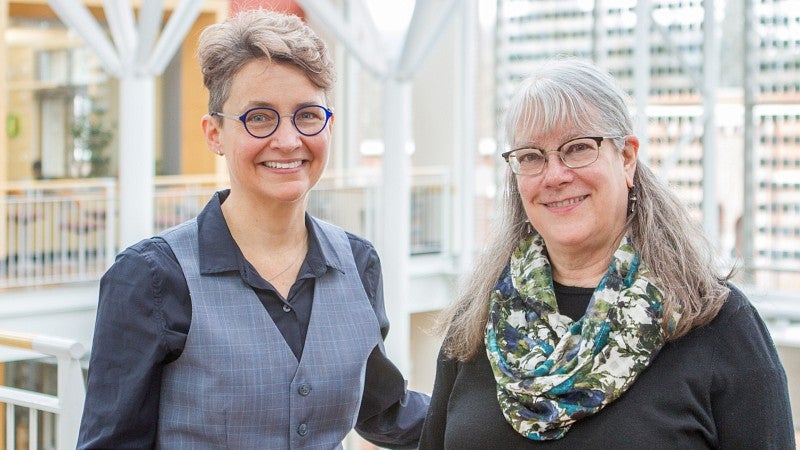An initiative at the UO is putting the humanities at the forefront of environmental problem-solving, and it’s about to grow much larger thanks to a $600,000 grant from The Andrew W. Mellon Foundation.
The award will enable the UO’s Center for Environmental Futures to deepen its commitment to environmental work, justice and sustainability as the center increases student research and training opportunities. It will also expand interdisciplinary partnerships addressing environmental issues through the humanities and allied fields.
“We know that today’s young people are deeply concerned about climate change and environmental justice as we face an extreme crisis with global climate change and political gridlock,” said professor Stephanie LeMenager, the Barbara and Carlisle Moore Chair in English and one of the center’s co-directors. “The Center for Environmental Futures will help faculty and students draw from skills that are core to the humanities — like critical thinking, ethical problem-solving, historical understanding and narrative storytelling — to confront major environmental problems in innovative and creative ways.”
Environmental humanities is not a new discipline at the UO. It has been an institutional strength for decades, stemming back to faculty specialization in the study of environmental literature, or ecocriticism, in the 1980s.
The Center for Environmental Futures will create an intellectual hub that builds on that strength and integrates expertise across the humanities, sciences, social sciences and other fields to tackle some of the most pressing environmental issues facing society.
“The Center for Environmental Futures ties together our liberal arts mission and our strength in environmental studies by fostering collaboration that addresses the complexity of environmental problems,” said Andrew Marcus, Tykeson Dean of Arts and Sciences. “The solutions sought by the Center for Environmental Futures incorporate core elements of the humanities, such as ethics, aesthetics, history, justice, culture, emotions and values, as well as addressing scientific perspectives.”

A core priority for the center is to cultivate relationships across disciplines, colleges and communities to address major environmental and social problems in collaborative ways.
“This center will help the public and academic community imagine the past, present and future of the environmental problems we face,” said professor Marsha Weisiger, the Julie and Rocky Dixon Chair in U.S. Western History and co-director of the center. “We saw an opportunity to support faculty and students by creating new networks and pathways for interdisciplinary work on critical environmental and social issues.”
Faculty members across a variety of disciplines already use the center, which was officially established in 2016, to expand their environmental research. Some current projects include probing into diversity initiatives on public lands, examining the oceans as a global commons, and analyzing the history of climate change and the effects of shrinking glaciers on society.
“In a very short time, the center has stimulated collaboration among humanists, creative artists, social scientists and scientists, and across the UO's professional schools of design, education, journalism, law and business,” Marcus said. “Given this progress and the superior leadership from our environmental humanities faculty — including Stephanie LeMenager, Marsha Weisiger, Sarah Wald, David Vázquez, Nicolae Morar and many others — it is therefore not surprising to me to see the success of the center in acquiring a highly prestigious Mellon grant.”
Weisiger and LeMenager are also working on their own research and public engagement project that will be integral to the center’s work for the next few years. The pair is looking into the past, present and future of Oregon’s public lands by conducting field work across the state and hosting community conversations with stakeholders and stewards about the value and challenges of public lands in Oregon.
“Oregon is a prime location to think about how to bridge urban-rural divides through increased dialogue with local communities,” Weisiger said. “This research will contribute valuable information and perspectives to the ongoing national and international conversations about justice, climate change and public lands.”
The two researchers will publish a digital map showcasing the past and present of Oregon’s public lands alongside recorded interviews. They will also co-author a book, “To Speak of Common Places: The Past and Futures of America’s Public Lands,” which is set for submission to a publisher in summer 2020.
The Center for Environmental Futures was jumpstarted with seed funding Weisiger and LeMenager received through a 2017 Interdisciplinary Award in the Humanities and Social Sciencesfrom the UO’s office of research and innovation. The $25,000 grant was provided by the University of Oregon Foundation to fund Weisiger and LeMenager’s public lands project.
The initiative also received $141,000 from an American Council of Learned Societies collaborative research grant. The faculty members credit that funding, as well as early support from the UO’s College of Arts and Sciences, as crucial to getting the project up and running.
“This is an exciting time for the center, which epitomizes our environmental research and education goals and potential at UO,” Marcus said.
—By Emily Halnon, University Communications


